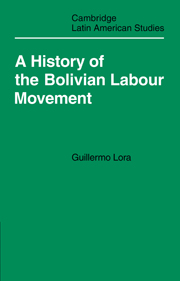Book contents
- Frontmatter
- Contents
- Editor's introduction
- Book 1 Protection versus free trade
- Book 2 Mineowners, artisans and Utopian socialists
- Book 3 Workers and the Liberal Party 1900–20
- Book 4 The nineteen-twenties
- Book 5 From the Chaco defeat to the Catavi massacre 1932–42
- Book 6 The workers become revolutionary
- Book 7 The rise and fall of the Central Obrera Boliviana
- Book 8 The military versus the unions
- Notes
- Editor's suggested reading
- Index
Book 2 - Mineowners, artisans and Utopian socialists
Published online by Cambridge University Press: 07 September 2010
- Frontmatter
- Contents
- Editor's introduction
- Book 1 Protection versus free trade
- Book 2 Mineowners, artisans and Utopian socialists
- Book 3 Workers and the Liberal Party 1900–20
- Book 4 The nineteen-twenties
- Book 5 From the Chaco defeat to the Catavi massacre 1932–42
- Book 6 The workers become revolutionary
- Book 7 The rise and fall of the Central Obrera Boliviana
- Book 8 The military versus the unions
- Notes
- Editor's suggested reading
- Index
Summary
The rise of the mineowners
One can but ask what became of the wealthy mineowners of the colonial period, and the powerful guild of azogueros (silver smelters), who in their time created the exceedingly important bank of San Carlos de Potosí. These men built their wealth on the corpses of the mitayos (forced labourers). They worked together in the guild to introduce many revolutionary changes in the mining industry, and were prepared to overcome any obstacle. Unlike other Latin American countries, Upper Peru did not have a powerful merchant sector with strong connections with European capitalism; this is to say, it lacked the nucleus for a potential contemporary bourgeoisie.
The wars of independence had disastrous consequences for the mining industry. The majority of mines were abandoned, including the Real Socavon de Potosí, which was not worked again until 1851, when the indefatigable entrepreneur, Don Avelino Aramayo, set up a company to re-open it. But as yet this has not produced satisfactory results, owing to the shortage of capital. However, capital is now available in the United States, where the idea has arisen of re-organising the Bolivian enterprise into a more efficient one, based on the capital, personnel and machinery which can be found in the United States for such a colossal undertaking. The fulfilment of this plan would not only enrich the entrepreneurs who sponsor it, but also re-establish the proverbial grandeur of the city of Potosí, and the economic well-being of the surrounding regions.
- Type
- Chapter
- Information
- A History of the Bolivian Labour Movement 1848–1971 , pp. 30 - 69Publisher: Cambridge University PressPrint publication year: 1977



